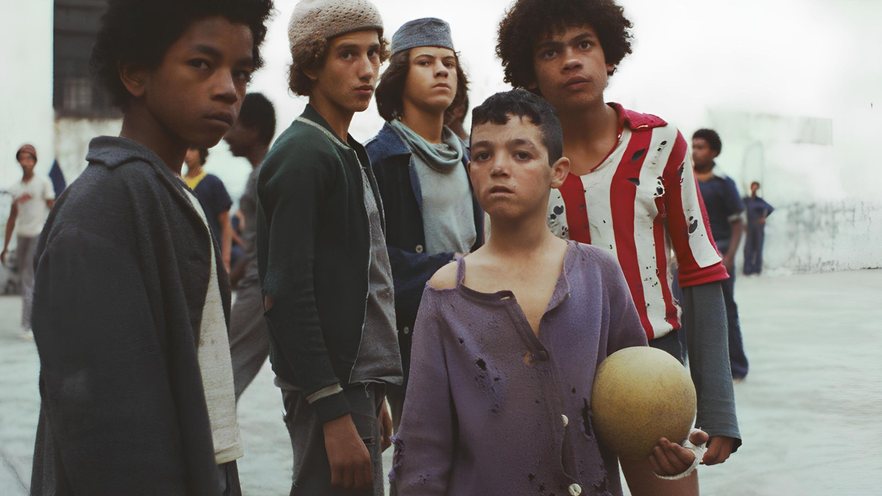Confusion ended up taking Pixote: the law of the weakest, long of Hector Babenco, from the dispute for a gold statuette in the award
This Sunday, March 2, the 97th edition of Oscar And this year, Brazil has a great chance of winning its first gold statuette: I’m still here, Walter Salles (Central do Brasil), is indicated in three categories, including better film, the main honor of the biggest cinema awards.
In the past, however, Brazil came very close to winning the coveted “Golden Bald”, but Pixote: The law of the weaker, Hector Babenco (1946-2016) Launched in 1980, it was disqualified by a disagreement.
Brazil has already been nominated for the category of best foreign film – now known as the best international film – on four occasions: in 1963, with The Promise Payer (1962); In 1996, with The quatrilho (1995); In 1998, with What is that, companion? (1997) and, in 1999, with Central do Brasil (1998). However, it was in 1982 that the country was closer to winning … just when it was disqualified.
Pixote: The law of the weaker It was the film selected by Embrafilme to run for an Oscar spot in the category of Best Foreign Film in 1982. However, since the early 1980s, the Oscar -responsible film arts and sciences had left its rules for the most strict foreign films, limiting the release window for other countries.
For a foreign film to compete for the 1982 Oscars, it should be released in its country of origin between November 1, 1980 and October 1, 1981, at least seven days with ticket sales.
When debuted in the United States in 1981, Pixote: The law of the weaker had a very positive reception of the public and the critics, with the name of the actress Marília Pera even being considered a separate appointment in the awards.
However, what seemed to be a dream about to come true eventually became frustration. A few days after Brazil confirmed the submission of the film as an Oscar candidate for best foreign film, the gym issued a telegram to Embrafilme informing that the film did not fulfill the requirements of the debut date in Brazil and was therefore disqualified.
Embrafilme then requested a meeting from the Academy to understand the reason for the disqualification and the explanation came: Pixote: The law of the weaker He would have debuted in Brazil in September 1980, when he could only have been released from November that same year.
Representatives of Embrafilme claimed that the supposed early debut of Pixote: The law of the weaker In Brazil it was a “Preview” -As stated in the gym regulation-which, in their understanding, was a premiere.
However, for the gym, the word “Preview” It meant a test display or, at most, a very exclusive event, such as the film’s screening for sponsors or cast, and considered that the film, in fact, had premiered before the allowed period. With this, the campaign for the Oscar was dismantled and the gold statuette again turned into a distant dream.
Even outside the Oscar, Pixote: The law of the weaker managed to be nominated for the Golden Globe for best foreign film in 1982, but lost the award to the British Fire Carriage (1981). In the biggest awards in cinema, the “Golden Bald” went to the Hungarian Mephisto (1981).
Rolling Stone Brazil Cinema Special
The cinema is the subject of the new special printed of the Rolling Stone Brazil. In a magazine dedicated to seventh art lovers, we interviewed Francis Ford Coppolawhich reaches 85 years amid the release of his new movie, Megalópolisbold and millionaire endeavor financed by himself.
Unshable in the face of controversial reactions to the novelty, which took about 40 years to get out of paper, the filmmaker defends the boldness of being creative of the film industry and opens, in good Portuguese, the influence of Brazil on his new movie: “Joy”.
The special also brings conversations with Walter Salles, FERNANDA TORRES and Selton Mello on I’m still herea chat about soundtracks with the conductor João Carlos Martinsan exclusive list of the 100 best films in history (50 nationals, 50 international), another list of the 101 largest trails in the history of cinema, one warm for the Oscar 2025 and the radar of globe launches, Globo Filmes, O2 Play and O2 movies for the coming months.
The Special Cinema of Rolling Stone Brazil It is already on newsstands, but can also be bought at the EDITORA PROFILE store for R $ 29.90. Check it out:
See this photo on InstagramA publication shared by Rolling Stone Brasil (@rollingstonebrasil)
Also read:Who wins the best film award at Oscar 2025? Vote for your favorite!
Oscar 2025: Who wins the best film award? Vote for your favorite!
- I’m still here
- Anora
- The brutalist
- A complete unknown
- Conclave
- Dune: Part 2
- Emilia Pérez
- The Nickel Reformat
- The substance
- Wiced
Source: Rollingstone
Rose James is a Gossipify movie and series reviewer known for her in-depth analysis and unique perspective on the latest releases. With a background in film studies, she provides engaging and informative reviews, and keeps readers up to date with industry trends and emerging talents.


![Tomorrow belongs to us: What awaits you in the episodes of 2052 and 2053 on October 15, 2025 [SPOILERS] Tomorrow belongs to us: What awaits you in the episodes of 2052 and 2053 on October 15, 2025 [SPOILERS]](https://fr.web.img6.acsta.net/img/39/95/3995a2d00abbf3c01161818d01a95388.jpg)



